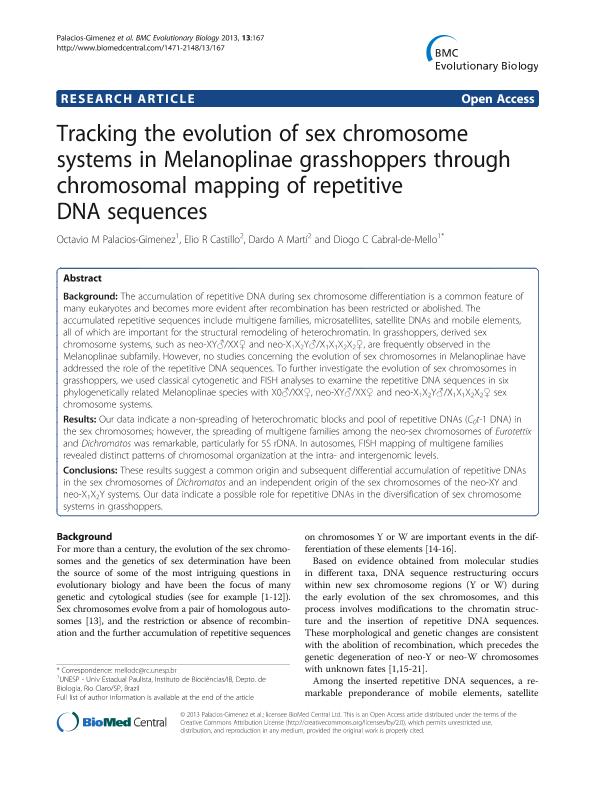Mostrar el registro sencillo del ítem
dc.contributor.author
Palacios Gimenez, Octavio M.
dc.contributor.author
Castillo, Elio Rodrigo Daniel

dc.contributor.author
Marti, Dardo Andrea

dc.contributor.author
Cabral de Mello, Diogo C.
dc.date.available
2015-08-27T16:37:33Z
dc.date.issued
2013-08
dc.identifier.citation
Palacios Gimenez, Octavio M.; Castillo, Elio Rodrigo Daniel; Marti, Dardo Andrea; Cabral de Mello, Diogo C.; Tracking the evolution of sex chromosome systems in Melanoplinae grasshoppers through chromosomal mapping of repetitive DNA sequences; BioMed Central; BMC Evolutionary Biology; 13; 167; 8-2013; 1-12
dc.identifier.issn
1471-2148
dc.identifier.uri
http://hdl.handle.net/11336/1845
dc.description.abstract
Background: The accumulation of repetitive DNA during sex chromosome differentiation is a common feature of many eukaryotes and becomes more evident after recombination has been restricted or abolished. The accumulated repetitive sequences include multigene families, microsatellites, satellite DNAs and mobile elements, all of which are important for the structural remodeling of heterochromatin. In grasshoppers, derived sex chromosome systems, such as neo-XY♂/XX♀ and neo-X1X2Y♂/X 1X1X2X2♀, are frequently observed in the Melanoplinae subfamily. However, no studies concerning the evolution of sex chromosomes in Melanoplinae have addressed the role of the repetitive DNA sequences. To further investigate the evolution of sex chromosomes in grasshoppers, we used classical cytogenetic and FISH analyses to examine the repetitive DNA sequences in six phylogenetically related Melanoplinae species with X0♂/XX♀, neo-XY♂/XX♀ and neo-X1X2Y♂/X1X1X 2X2♀ sex chromosome systems. Results: Our data indicate a non-spreading of heterochromatic blocks and pool of repetitive DNAs (C 0 t-1 DNA) in the sex chromosomes; however, the spreading of multigene families among the neo-sex chromosomes of Eurotettix and Dichromatos was remarkable, particularly for 5S rDNA. In autosomes, FISH mapping of multigene families revealed distinct patterns of chromosomal organization at the intra- and intergenomic levels. Conclusions: These results suggest a common origin and subsequent differential accumulation of repetitive DNAs in the sex chromosomes of Dichromatos and an independent origin of the sex chromosomes of the neo-XY and neo-X1X2Y systems. Our data indicate a possible role for repetitive DNAs in the diversification of sex chromosome systems in grasshoppers.
dc.format
application/pdf
dc.language.iso
eng
dc.publisher
BioMed Central

dc.rights
info:eu-repo/semantics/openAccess
dc.rights.uri
https://creativecommons.org/licenses/by-nc-sa/2.5/ar/
dc.subject
Grasshoppers
dc.subject
Repetitive Dna
dc.subject
Sex Chromosome Evolution
dc.subject
Fish
dc.subject.classification
Genética y Herencia

dc.subject.classification
Ciencias Biológicas

dc.subject.classification
CIENCIAS NATURALES Y EXACTAS

dc.subject.classification
Zoología, Ornitología, Entomología, Etología

dc.subject.classification
Ciencias Biológicas

dc.subject.classification
CIENCIAS NATURALES Y EXACTAS

dc.title
Tracking the evolution of sex chromosome systems in Melanoplinae grasshoppers through chromosomal mapping of repetitive DNA sequences
dc.type
info:eu-repo/semantics/article
dc.type
info:ar-repo/semantics/artículo
dc.type
info:eu-repo/semantics/publishedVersion
dc.date.updated
2016-03-30 10:35:44.97925-03
dc.journal.volume
13
dc.journal.number
167
dc.journal.pagination
1-12
dc.journal.pais
Reino Unido

dc.journal.ciudad
Londres
dc.description.fil
Fil: Palacios Gimenez, Octavio M.. Universidade Estadual Paulista Julio de Mesquita Filho; Brasil;
dc.description.fil
Fil: Castillo, Elio Rodrigo Daniel. Consejo Nacional de Investigaciones Científicas y Técnicas. Centro Científico Tecnológico - CONICET - Nordeste. Instituto de Biologia Subtropical; Argentina
dc.description.fil
Fil: Marti, Dardo Andrea. Consejo Nacional de Investigaciones Científicas y Técnicas. Centro Científico Tecnológico - CONICET - Nordeste. Instituto de Biologia Subtropical; Argentina
dc.description.fil
Fil: Cabral de Mello, Diogo C.. Universidade Estadual Paulista Julio de Mesquita Filho; Brasil;
dc.journal.title
BMC Evolutionary Biology

dc.relation.alternativeid
info:eu-repo/semantics/altIdentifier/doi/http://dx.doi.org/doi:10.1186/1471-2148-13-167
dc.relation.alternativeid
info:eu-repo/semantics/altIdentifier/url/http://www.biomedcentral.com/content/pdf/1471-2148-13-167.pdf
Archivos asociados
